
On 29 April 2021, as part of the Young Women and Next Generation Initiative (YWNGI), the VCDNP and the International Affairs Institute (IAI) in Rome, Italy, with the support of the EU Non-Proliferation and Disarmament Consortium (EUNPDC), organized the second public outreach event focused on the EU and its policies on non-proliferation and disarmament, as well as its engagement with academia and the younger generation. The panellists included former High Representative of the Union for Foreign Affairs and Security Policy and Vice‑President of the European Commission, Rector of the College of Europe, Federica Mogherini, Special Envoy for Disarmament and Non-Proliferation of the European External Action Service (EEAS), Ambassador Marjolijn van Deelen, and the EUNPDC Chair, Dr. Sibylle Bauer.

IAI’s Executive Vice President Ettore Greco provided welcome remarks and VCDNP’s Executive Director Elena Sokova moderated the session. Over 300 individuals attended the event, including many of the Young Women in Non‑Proliferation and Disarmament Mentorship Programme participants and other EUNPDC next generation conference and training course individuals. The high level of interest demonstrates the strong need for these discussions and opportunities to interact.
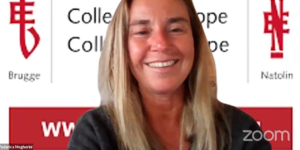
Federica Mogherini shared her experience working as the former High Representative, highlighting the role her team played in 2015 in the final months of the Joint Comprehensive Plan of Action (JCPOA) negotiations with Iran. Stressing that negotiations on the JCPOA are again taking place in Vienna, Austria, Rector Mogherini noted the crucial role of the EU in maintaining and monitoring the agreement, despite the US’s withdrawal in 2018. The EU had a unique role to play in the negotiations as it served as the facilitator and the depository for the text of the agreement. The EU also conducted a fair amount of detailed, technical work on the agreement to make sure nothing was left to interpretation, especially regarding sanctions related issues and nuclear commitments. The facilitator role provided the EU with the institutional basis to reach out to the other parties to the JCPOA after the US withdrew, to ensure that the agreement was preserved and monitored. According to Rector Mogherini, the EU has a role to play in non‑proliferation and disarmament, especially given Europe’s history and experience of devastation when arms control fell short, emphasizing that the EU should become champions in solidifying the international community’s reliability in arms control, non‑proliferation and disarmament infrastructures and regimes.
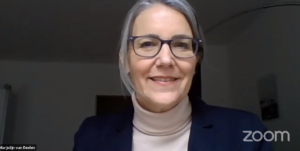
Supporting arms control architecture and treaties, strengthening multilateral institutions, and supporting third countries in developing their arms control, non-proliferation and disarmament architecture is at the core of the EU’s non-proliferation and disarmament strategy. Ambassador Marjolijn van Deelen highlighted that the EU is committed to strengthening the international security environment and recognizes that it cannot tackle global challenges, like those posed by proliferation risks, alone. The EU has multiple institutions focused on non-proliferation and disarmament ranging from the EEAS, which serves as the EU’s diplomatic service, to the EU Commission which manages the EU’s policies on dual-use export controls and the EU Chemical, Biological, Radiological, and Nuclear Risk Mitigation Centres of Excellence, to the Joint Research Centre focused on technical issues related to disarmament verification. Nuclear safeguards in the EU are implemented by EURATOM that also provides valuable expertise on international safeguards development to the International Atomic Energy Agency (IAEA) and EEAS office. In international fora the EU is active in taking common positions in support of existing treaties, encouraging other States to accede to treaties they are not yet party to, and supporting institutions, like the IAEA and the Comprehensive Nuclear-Test-Ban Treaty Organization, that support these treaties. The EU strongly believes in the powers of multilateral diplomacy to resolve problems peacefully and is devoted to ensuring the international system is fit for purpose. To do this, the EU works closely in partnership with other institutions and academia.
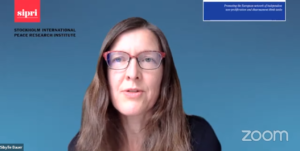
The European network of independent non-proliferation and disarmament think tanks, was established in 2010 with the full support of all EU Member States to contribute to independent research and education activities in non-proliferation and disarmament. Dr. Sibylle Bauer shared with the audience the make-up of the Network, comprised of over 100 members, and of the Consortium that coordinates its activities . Dr. Bauer also talked about the various activities, of which the YWNGI is included, that the Consortium implements with the support of the EU. Importantly, it was emphasized that the EUNPDC focuses on a wide range of issues in non-proliferation and disarmament, ranging from nuclear, to conventional, to biological, to outer space and emerging technologies. It was also stressed that the EUNPDC is not limited to institutions in EU Member States but also includes members from third countries outside the EU. For more information on the EUNPDC and its activities please consult the nonproliferation.eu website.
The prepared remarks were followed by a second round of questions seeking panellists' advice for young women and the next generation interested in entering the field of arms control, non‑proliferation and disarmament. Rector Mogherini emphasized the importance of leading by example, noting that the EU delegation sometimes was only composed of women whereas their interlocuters were solely comprised of men. She also noted that to really address the imbalances in the field, it is important to start with academia and the curricula they encourage their students to follow. The panellists all agreed on a strong list of seven skills and qualities for both professional and personal growth presented by Dr. Sibylle Bauer:
"What also is really important, I think, is to help others not just get a foot in the door but then to help them stay in the field and climb up." - Sibylle Bauer
Adding to this list, other panellists emphasized the importance of working in teams, indicating that every role in a team is important and no one role should be perceived as any more or less significant.
"You need a mix of people that have different competences and when you put those together you can be much stronger." - Marjolijn van Deelen
There was resounding agreement that passion and interest in what one is doing is the best guide to navigating one’s career. Also, the panellists encouraged participants to not be afraid to try new things and to be willing to go into depth on topics that may not fall within their educational background, whether it be more policy-oriented or technical.
"I think passion in what you are doing is the only thing that really counts." - Federica Mogherini
Some highlights from the question-and-answer session include insights into the difficulties in forming a common position in the EU, noting the diversity of the group and the need for fierce, internal debates. Once a common position or statement has been agreed, it serves as an umbrella under which other like-minded countries can align themselves. All speakers stressed that given the divergent views within the EU, when a common position has been adopted, especially on controversial matters, it is a powerful statement that can offer hope to the larger international community and refocus energy on where agreement exists, and action can be taken.
Watch the full webinar recording below.

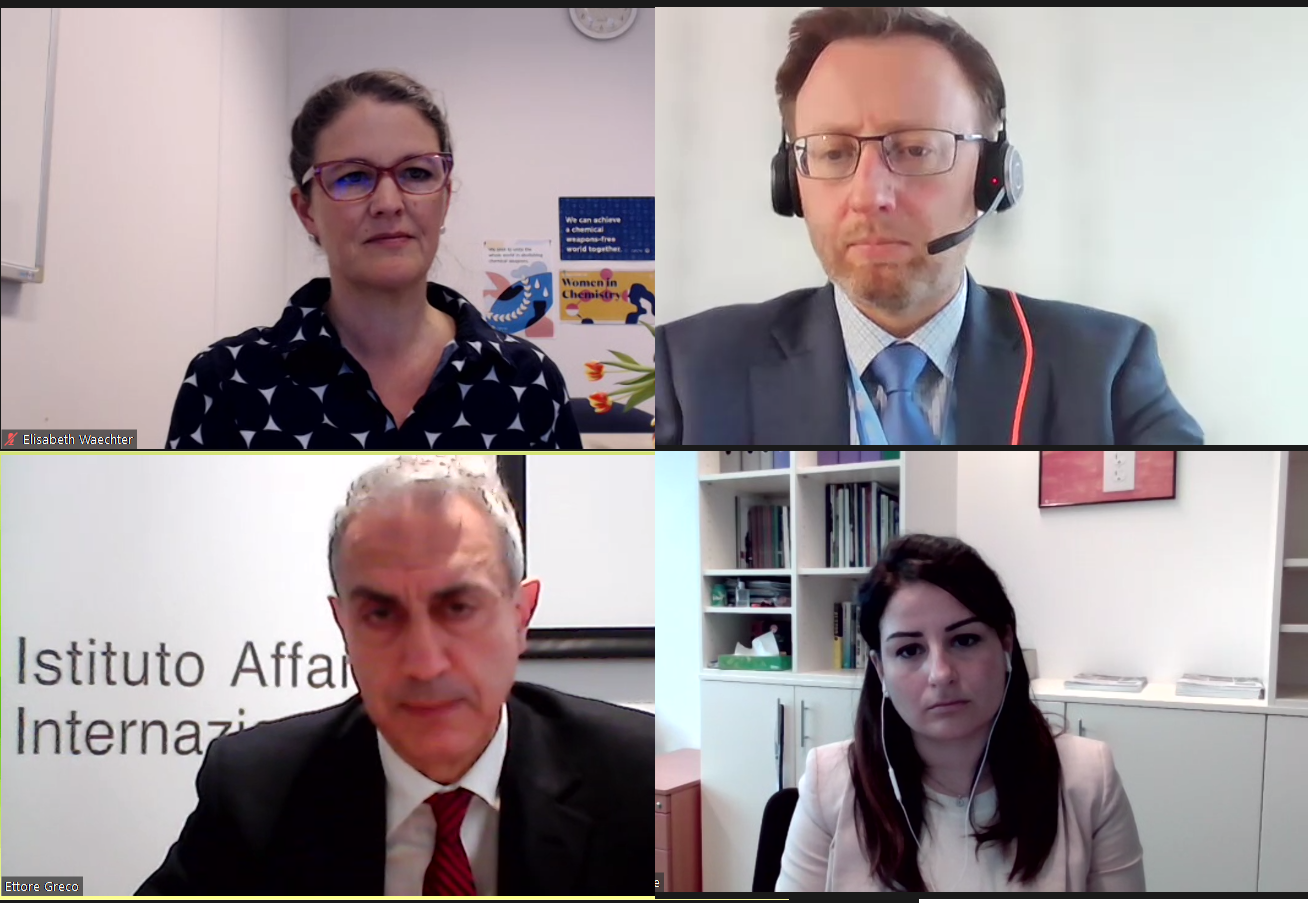
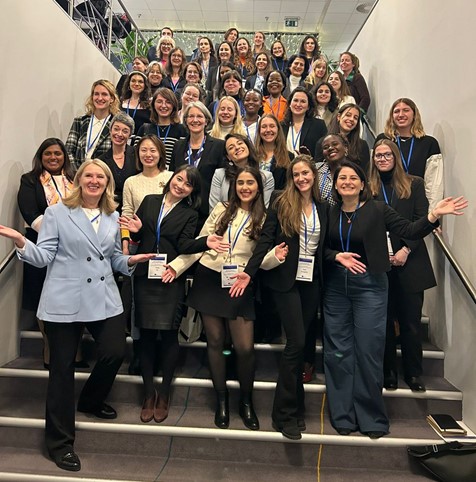
By continuing to use the site, you agree to the use of cookies. more information
The cookie settings on this website are set to "allow cookies" to give you the best browsing experience possible. If you continue to use this website without changing your cookie settings or you click "Accept" below then you are consenting to this.